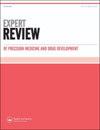Ivosidenib in IDH-mutant cholangiocarcinoma: where do we stand?
IF 1.2
Q4 PHARMACOLOGY & PHARMACY
Expert Review of Precision Medicine and Drug Development
Pub Date : 2021-04-13
DOI:10.1080/23808993.2021.1915126
引用次数: 0
Abstract
ABSTRACT Introduction: Cholangiocarcinomas (CCAs) are rare and heterogeneous malignancies associated with poor prognosis, with most of the patients presenting with advanced disease at diagnosis. The recent advent of molecular profiling has led to the identification of several druggable genetic aberrations, and among these, there is an increasing interest in isocitrate dehydrogenase-1 (IDH-1) mutations, with the IDH-1 inhibitor ivosidenib that has reported interesting results in advanced CCA patients. Areas covered: Herein, we will critically discuss the current state of the art of ivosidenib in IDH-mutant CCA, especially focusing on efficacy and safety results of recent trials assessing this IDH-1 inhibitor. Expert opinion: According to the results of phase I studies and the recently published ClarIDHy phase III trial, the IDH-1 inhibitor ivosidenib seems to be associated with a manageable safety profile and interesting antitumor efficacy. In particular, the ClarIDHy showed that ivosidenib treatment reported improved progression-free survival (PFS) compared to placebo in previously treated patients, with median PFS of 2.7 and 1.4 months, respectively. However, several questions remain unanswered and the effective impact of ivosidenib in IDH-mutant CCA remains open.Ivosidenib治疗IDH突变型胆管癌:我们的立场是什么?
摘要:胆管癌(CCAs)是一种罕见的异质性恶性肿瘤,预后较差,大多数患者在诊断时表现为疾病晚期。最近分子谱分析的出现导致了几种可药物遗传畸变的鉴定,其中,对异柠檬酸脱氢酶-1 (IDH-1)突变的兴趣越来越大,IDH-1抑制剂ivosidenib在晚期CCA患者中已经报道了有趣的结果。涵盖的领域:在这里,我们将批判性地讨论ivosidenib在IDH-1突变型CCA中的现状,特别是关注最近评估这种IDH-1抑制剂的试验的有效性和安全性结果。专家意见:根据I期研究结果和最近发表的ClarIDHy III期试验,IDH-1抑制剂ivosidenib似乎具有可控的安全性和有趣的抗肿瘤功效。特别是,ClarIDHy显示,与安慰剂相比,ivosidenib治疗报告了先前治疗患者的无进展生存期(PFS),中位PFS分别为2.7个月和1.4个月。然而,仍有几个问题没有得到解答,ivosidenib对idh突变型CCA的有效影响仍然是开放的。
本文章由计算机程序翻译,如有差异,请以英文原文为准。
求助全文
约1分钟内获得全文
求助全文
来源期刊

Expert Review of Precision Medicine and Drug Development
PHARMACOLOGY & PHARMACY-
CiteScore
2.30
自引率
0.00%
发文量
9
期刊介绍:
Expert Review of Precision Medicine and Drug Development publishes primarily review articles covering the development and clinical application of medicine to be used in a personalized therapy setting; in addition, the journal also publishes original research and commentary-style articles. In an era where medicine is recognizing that a one-size-fits-all approach is not always appropriate, it has become necessary to identify patients responsive to treatments and treat patient populations using a tailored approach. Areas covered include: Development and application of drugs targeted to specific genotypes and populations, as well as advanced diagnostic technologies and significant biomarkers that aid in this. Clinical trials and case studies within personalized therapy and drug development. Screening, prediction and prevention of disease, prediction of adverse events, treatment monitoring, effects of metabolomics and microbiomics on treatment. Secondary population research, genome-wide association studies, disease–gene association studies, personal genome technologies. Ethical and cost–benefit issues, the impact to healthcare and business infrastructure, and regulatory issues.
 求助内容:
求助内容: 应助结果提醒方式:
应助结果提醒方式:


